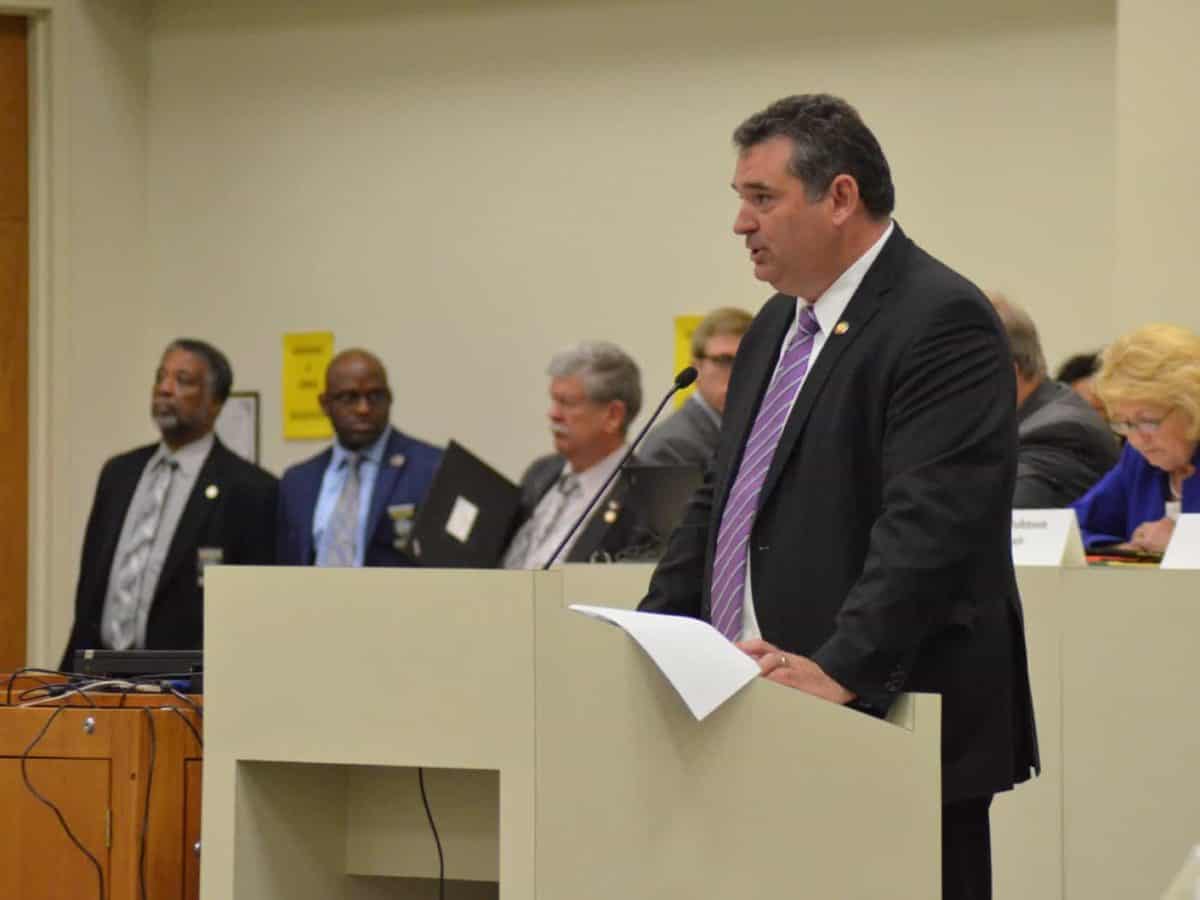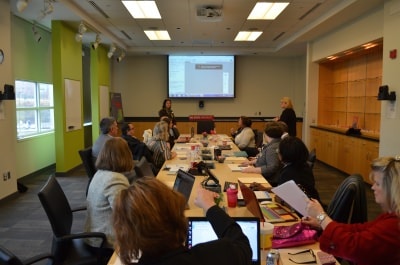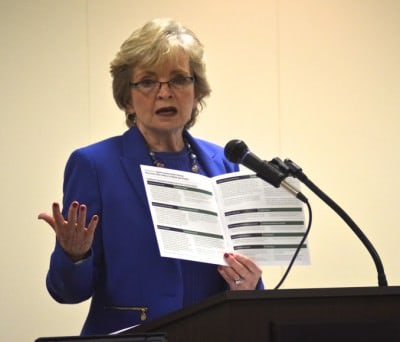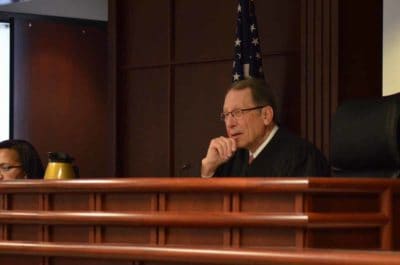
A General Assembly committee voted on a conference report to change the way principals who were paid on the teacher salary schedule last year will be paid this year. But the vote only happened after hours of rescheduling and behind-the-scenes negotiations.
The principal pay correction in the report allows principals paid on the teacher salary schedule last year to continue to get that pay without a loss in longevity this year. Some principals would have received less this year under the new principal pay schedule because it no longer includes longevity. The current principal pay schedule has a hold harmless provision for this year only that is supposed to prevent any principals from losing pay, but that hold harmless didn’t apply to principals paid on the teacher salary schedule last year. They may still be paid on the teacher salary schedule this year, but without the hold harmless, they lost the longevity pay, leading to a cut in salary.
The head of BEST NC, a nonprofit, nonpartisan coalition of business leaders that supported the principal pay plan and has advocated for principal issues at the General Assembly, said the fix did not go far enough.
“The principal pay technical correction that the Legislature passed yesterday is an important one to ensure that no principal sees a drop in pay this school year,” said Brenda Berg, president and CEO of BEST NC, in an e-mail. “Unfortunately, by failing to extend the law’s ‘hold harmless’ provision, the General Assembly missed an important chance to also provide security to over 300 principals who are facing unneeded uncertainty about their salary next year. We are disappointed to see this drag on, and trust that our elected leaders will prioritize the fix when they next return to Raleigh.”
Extending the hold harmless, or finding some other fix to the issue, was a goal that Rep. Linda Johnson, R-Cabarrus, had coming into the special session. But there was no sign that legislators were considering that yesterday.
In a scheduled House appropriations committee earlier in the afternoon, lawmakers were originally supposed to look at principal pay and class size as part of a budget technical corrections bill. On principal pay, they were slated to discuss the fix that was ultimately adopted at the end of the day. Read here for more on that issue.
But House members also planned to take up the K-3 class size requirements. Legislatively mandated class-size limits for grades K-3 go into effect next year, and some districts have said they will face space limitations and will have to end extracurriculars like music, art and physical education as a result. Read an overview of the class-size issue here and here. The House was planning to possibly loosen the restrictions during its committee meeting.
The Senate appropriations committee scheduled for earlier in the afternoon was going to take up the principal pay fix in its technical correction bill but not the K-3 class size issue.
House appropriations was delayed. The Senate appropriations committee was canceled. A joint committee was held in the early evening in place of both chambers’ individual appropriations meetings.
Rep. Craig Horn, R-Union, an influential education legislator, blamed all the confusion on a breakdown of communication between the House and the Senate.
Rep. Nelson Dollar, R-Wake, senior chair of the House appropriations committee, said the delays were simply meant to streamline the process and avoid debate back and forth between the chambers.
“We decided in the interest of time…that we would spend the additional hours this afternoon and see if we could come up with a compromise,” he said.
In the buildup to and during the joint appropriations meeting, coordinated tweets using the hashtag #ClassSizeChaos poured into legislators’ Twitter accounts and the #ncga and #nced hashtag.
.@NCHouseSpeaker @SenatorBerger #NCED families want #NCGA to fix #ClassSizeChaos NOW!
— Scott Quilty (@ScottQuilty) October 4, 2017
K-3 class size mandate is #SetUpToFail. Shame on #NCGA. Fix #ClassSizeChaos now! @NCHouseSpeaker @SenatorBerger @GrierMartin @jay_chaudhuri
— merranie zellweger (@merrstew) October 4, 2017
Please fix #ClassSizeChaos and please #FullyFundSpecials. Thank you.@deannaballardnc #NCGA #WeAreJGMES
— Jeffreys Grove Elem (@JeffreysGroveES) October 4, 2017
.@DavidCurtisNC Fix #ClassSizeChaos. For our kids, for #nced for our future. pic.twitter.com/WGkuXJLdRR
— Susan Book (@susan_book) October 4, 2017
During the meeting, the two sides discussed a conference report with a number of technical corrections to the budget. The principal pay fix remained, but the report did not deal with class size. The significance of the conference report is that the two sides hammered out their differences beforehand, and once the report passed the appropriations committee, both sides could take it to the floors of their respective chambers without the need for further negotiations between the Senate and House.
Sen. Jay Chaudhuri, D-Wake, asked Rep. David Lewis, R-Harnett, who was presenting the report, why fixes to the class size restrictions were not included. He prefaced his question by listing some of the ways the restrictions were going to cause problems next year in Wake County.
“Given these concerns by both parents and school districts, why was the original provision…removed from this conference report?” he asked.
Lewis said the issue would be something that the General Assembly comes back to during the short session in the spring.
“I don’t know that tonight is the best time to discuss something that is not in the report,” he said.
Dollar said the potential fixes to the class size restriction issue go beyond the scope of a technical corrections bill, which is why it was not in the report.
Rep. Cynthia Ball, D-Wake, asked for more clarity on when the General Assembly would discuss the class size restriction issue.
“I’m just interested in a timeline for when we might be able to discuss that so I can respond to the many e-mails I’m getting,” she said.
Dollar responded that those conversations are already ongoing between the chambers.
Rep. Dennis Riddell, R-Alamance, praised the inclusion of the fix in the report but said the legislature’s work is not done.
“I have heard from some of my principals in Alamance County…that there are still some other issues that we need to tackle,” he said.
He mentioned the need to extend the hold harmless provision in the principal pay schedule beyond this year, and addressing the fact that some principals whose schools exceed academic growth for multiple years are left out of the principal bonus program. He said those issues will need to be looked at in the future but was glad the General Assembly took up what fixes they could to the principal pay schedule during this special session.
The Senate members in the joint appropriations committee did not vote on the budget technical corrections report because they are not required to by their chamber’s rules before the report moves to the Senate floor. The House rules, however, necessitated a vote from House members. They voted in favor of the report on a voice vote, 35 to 29.
The technical corrections report included a number of non-education related items that were the focus of strong debate.
Both chambers will take up the report Thursday.
Recommended reading



